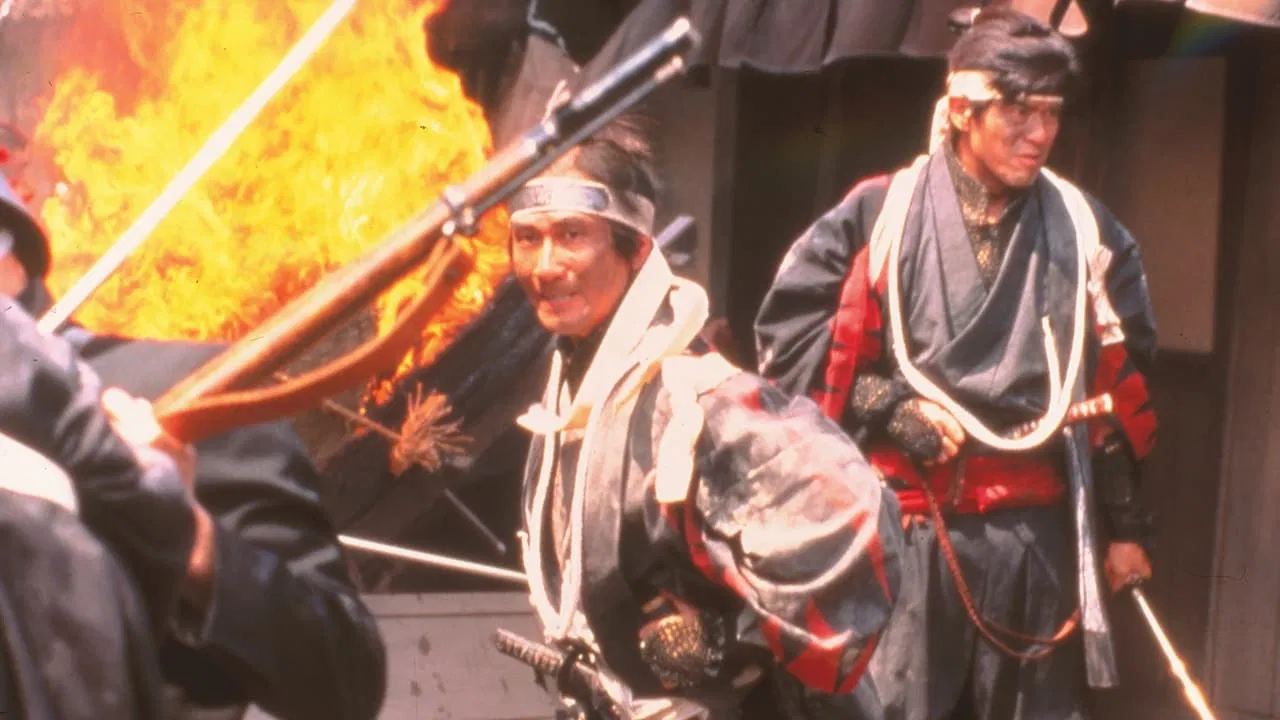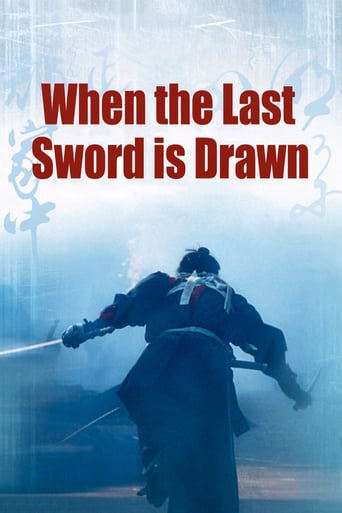Yash Wade
Close shines in drama with strong language, adult themes.
Sienna-Rose Mclaughlin
The movie really just wants to entertain people.
Sanjeev Waters
A movie that not only functions as a solid scarefest but a razor-sharp satire.
Raymond Sierra
The film may be flawed, but its message is not.
ebiros2
This movie is based on Jiro Asada's novel. This was the first samural novel for Asada, and it was also turned into a TV drama in 2002. The movie won the Japanese Academy Award of 2004.The story is about period leading up to Meiji reform in Japan. Japan was split into two faction. One side was supporting the Shogunate, and the other the Emperor. The story is told by Hajime Saito (Hiroshi Sato) who found a picture of Kanichiro Yoshimura (Kiichi Nakai) at the doctors office. A war partner he fought together during Meiji reform. The doctor was related to Kanichiro in that he married his daughter. Story is told by both the doctor and Hajime about what they know about Kanichiro.Jiro Asada got the idea for writing this novel because his daughter started attending college in Morioka which used to be the territory of Nanbu clan where Kanichiro used to live.The story to me makes no sense at all. Kanichiro thought about his family enough to run away from his lord's clan to find a better paying job outside. Why would someone like that take a suicidal route to be on the losing side to the end despite the fact that Hajime and others told him not to ? I also don't understand why his son decided to join the war as well. He needed to look after the family after his father.To me the story seems to rely on plot Japanese call "Shini ochi" where story ends by the character dying. This is convenient, because it draw pity from the audience, and brings to light the moral perfection of the one who dies.The movie attempts to be like Yoji Yamada's series of samurai movies, but fails because the original story isn't as well formulated as Shuhei Fujisawa's novels, and director didn't do the caliber job as Yoji Yamada. On the defense of director Yojiro Takida who directed this movie, originally this movie was supposed to be directed by Shinji Soumai but due to his sudden demise, Takida was called in to fill his role. This might not have given Takida enough time to get fully prepared.The story makes this movie not as entertaining as it could be. But execution is pretty good, so it's worth watching for its production value.
jerrythecow
7/10, ***.5/4Kanichiro Yoshimura (Kiichi Nakai) is a samurai who was forced to betray his clan in order to save his family. His life goes on in a new clan until finally, he crawls back wounded to his first clan, only to be forced to commit hara-kiri before even seeing his family including the daughter he's never seen.The script was a bit confusing. Of course, I saw it with subtitles and I have never been to Japan, but still. Other than that, I liked the script, especially Yoshimura's death monologue at the end, although it dragged a bit.Speaking of dragging, that's my #1 concern with this movie. After the final battle at the end where Yoshimura refuses to back down even against 100's of guns, it gets a bit boring. The monologue is a bit long, and it could have been cut down. Everything else after his death could also have been cut down to a few minutes, instead of the 10 or 20 minutes that it was.The directing was incredible! Yojiro Takita takes the simplest shots and uses them to create a beautiful story! (There was one problem that I noticed: They didn't leave footprints in the snow.) I loved how he framed his shots and used only a few shots to create a scene.The acting was pretty good, although some of it was weak. Nothing that good or that bad. Just average.All in all, a movie you must see!
siderite
This was a beautiful movie, yet a difficult one to watch. The main character, played very well by Kiichi Nakai, is a man of the land. He loves his country and his family and he is also a samurai. That puts him into a very uncomfortable position when money is too scarce for his family to be able to survive. He then does the dishonorable thing, he leaves the clan in order to earn money for his family.The story in itself is the message of the movie, with all its details, not the main storyline. The action is placed in the time when samurai are being replaced with gun powder and Japan is in great turmoil. In the end, he returns to his homeland and restores honor to his family, so it's a circular kind of tale, but in the meanwhile, you see how different people, in different situations and social classes, react, how friendships are made and unmade.What makes this movie better than most is the way the main character is constructed. He is far from the cliché of the samurai, a lot more human. If this could have been told in a shorter way, everyone would have been happier, though. While the last scenes are heartbreaking, they are also too theatrical for my taste.I have seen Twilight Samurai compared with this movie. I do think that TS was better, but this is still a very good movie.
watrmeln
"When the Last Sword..." covers an interesting period of Japanese history spanning the Tokugawa shogunate through the Meiji Restoration. As with "The Last Samurai" and "Twilight Samurai," it deals with the decline of the samurai order. Though "Last Samurai" approaches this using an outsider-cum-insider's view, and the "Twilight Samurai" from a internal character view, "When the Last Sword" is a character analysis set in a climate of abrupt socio-political change. Kanichiro, our anti-hero of sorts, is a paradox of contradictions. Honorable yet disloyal, frugal yet magnanimous, affectionate yet stern, he attempts to follow the path of the samurai in an turbulent era. I found the film very enjoyable for the first 2/3. Until then, the film works as an interesting study of the effects of socio-political changes on the samurai order, but suddenly shifts the attention over Kanichiro's internal struggles. I found this momentum shift jarring. The final scenes felt overly dramatic and drawn-out. In fact, I spent the last 30 minutes waiting for the end that never seemed to come. All in all, a fairly enjoyable film - it started strong but sputtered in the end.

